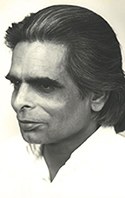To spread the original, universal and eternal truth, path or law of yoga, which remains forever the same in essence, yet always adapts to the time and place. |
ACCORDING TO THE THOMAS GOSPEL
43. His disciples said to him, "Who are you to say these things to us?" "You don't understand who I am from what I say to you. Rather, you have become like the Judeans, for they love the tree but hate its fruit, or they love the fruit but hate the tree."
Interpretation :
The question of the disciples challenges the right of Jesus to teach, as he seems an ordinary man (who are you to say these things). However, the true teacher is the self, not the man. So you cannot understand the man (understand who I am) by what he teaches (from what I say). Through the teachings you can only come to understand the self. This way, if you love the teacher in a way that places him above you, as more than an ordinary man, then the fruits of his teachings will not be satisfying to you, out of reach for the ordinary person you think yourself to be (you love the tree but hate the fruit). Or if you love the teachings in a way of claiming them as your own achievement, without seeing their true source which is the self, you will have jealous feelings towards the teacher (love the fruit but hate the tree).
52. His disciples said to him, "Twenty-four prophets have spoken in Israel , and they all spoke of you." He said to them, "You have disregarded the living one who is in your presence, and have spoken of the dead."
Interpretation :
The disciples seek reassurance about listening to Jesus in the announcement by the prophets of the coming savior, which they recognize as Jesus. Jesus points out that true reassurance on the value of his teachings will only come from the self, the beingness (the living one in your presence), where they may experience the truth directly themselves. The prophets are not only dead long ago, they have never truly lived (the dead) as the only one that truly lives is the self, the Supreme.
74. He said, "Lord, there are many around the drinking trough, but there is nothing in the well."
Interpretation :
Many disciples come to Jesus (the drinking trough) to be saved, but Truth is only found inside. The teacher can guide you inside, but cannot himself remove your ignorance and save you (there is nothing in the well).
91. They said to him, "Tell us who you are so that we may believe in you." He said to them, "You examine the face of heaven and earth, but you have not come to know the one who is in your presence, and you do not know how to examine the present moment."
Interpretation :
People ask Jesus for proof of his divine nature in order that they may be more confident in following his teachings. To that Jesus answers that while they may know much from studying the outer appearance of the universe through astrology and other sciences (examine the face of heaven and earth), they do not yet know the self (the one who is), as the beingness (in your presence), that always remains in the eternal now and can only be known (examined) by witnessing the now (the present moment).
108. Jesus said, "Whoever drinks from my mouth will become like me; I myself shall become that person, and the hidden things will be revealed to him."
Interpretation :
Those who truly listen to the words of the teacher (drinks from my mouth) will become like the teacher (like me). They will become the one truth of the self (I will become that person) and nothing will be left hidden (will be revealed).
 This introduction to the Thomas Gospel was written by Peter Marchand, who also wrote these books : "The Yoga of the Nine Emotions" and "The Yoga of Truth". Also browse our yoga video section for online classes by Peter Marchand.
This introduction to the Thomas Gospel was written by Peter Marchand, who also wrote these books : "The Yoga of the Nine Emotions" and "The Yoga of Truth". Also browse our yoga video section for online classes by Peter Marchand.
 Sanatan Society is an international networking association of students of the late Harish Johari, joining efforts to promote his teachings of yoga philosophy, tantra, worship, art and love. Sanatan Society stands
for the original, universal and eternal truth, path or law of yoga.
Though it is Hindu in origin, Sanatan Society is not limited to any religion,
race, time or country, nor in fact to any particular organisation. More about Sanatan Society...
Sanatan Society is an international networking association of students of the late Harish Johari, joining efforts to promote his teachings of yoga philosophy, tantra, worship, art and love. Sanatan Society stands
for the original, universal and eternal truth, path or law of yoga.
Though it is Hindu in origin, Sanatan Society is not limited to any religion,
race, time or country, nor in fact to any particular organisation. More about Sanatan Society...